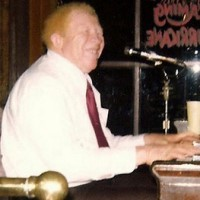Home » Jazz Musicians » Piano Red
Piano Red
Willie Lee Perryman, who performed during his career as "Piano Red" and as "Dr. Feelgood," was a self-taught pianist who played in the barrelhouse blues style. (The term barrelhouse was used to describe a loud percussive type of blues piano suitable for noisy bars or taverns.) His performing and recording careers emerged during the period of transition between completely segregated "race music" and "rhythm and blues," which was marketed to white audiences. Perryman was born on October 19, 1911, on a farm where his parents, Ada and Henry Perryman, sharecropped near Hampton. He was part of a large family, though sources differ on exactly how many brothers and sisters he had. Perryman was an albino African American, as was his older brother Rufus, who also had a blues piano career as "Speckled Red." When Perryman was six years old, his father gave up farming and moved the family to Atlanta to work in a factory. Not much is known about Perryman's education or early life, but he recalled that his mother bought a piano for her two albino sons. Both brothers had very poor vision, an effect of their albinism, so neither took formal music lessons, but they developed their barrelhouse style through playing by ear. Perryman sometimes recalled imitating Rufus's style after watching him play, but it is doubtful that his brother was a major influence. Rufus, nineteen years older than Perryman, left Georgia in 1925 and did not return until a 1960 visit. Another influence that Perryman cited in interviews was Fats Waller, whose records his mother brought home. Other influences were likely the local blues pianists playing at "house" or "rent" parties, which were common community fund-raisers of that era. By the early 1930s, Perryman was playing at house parties, juke joints, and barrelhouses in Georgia, Alabama, and Tennessee. He developed his percussive playing style and harsh singing style to compensate for the lack of sound systems and to overcome the noise of people talking in venues. He worked these circuits with other Georgia bluesmen, including Barbecue Bob, Charlie Hicks, Curley Weaver, and "Blind Willie" McTell. Red obtained seasonal employment performing in Brevard, North Carolina, a mountain resort town, and he commuted back and forth between there and Atlanta. The Brevard job brought him before white audiences; by 1934 he had also begun to play at white clubs in Atlanta Because of the popularity of blues on the radio, recording companies sent agents, looking for talent to sign and record, throughout the South on "field trips" from the 1920s until the mid-1930s.
Read moreTags
Music Fans and Media Celebrate the Release of Piano Red's the Lost Atlanta Tapes CD With Party & Tribute Show

Source:
Just Roots PR
ATLANTA, GA—A throng of music fans and media from the Southeast converged at Atlanta's Smith's Olde Bar on August 12 to celebrate the release (August 17) of the late and legendary Piano Red's The Lost Atlanta Tapes CD on Landslide Records. Produced by Michael Reeves and David Fulmer for Bang Bang Lulu Productions, The Lost Atlanta Tapes features 18 songs recorded live at Atlanta's Excelsior Mill in 1984, and represents the iconic entertainer's last known recording. It features some of ...
read more


























